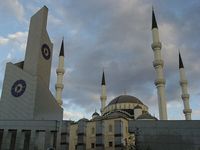ID :
221941
Fri, 01/06/2012 - 07:43
Auther :
Shortlink :
http://m.oananews.org//node/221941
The shortlink copeid
PKK says new Turkish constitution is chance for peace

Turkey's drafting of a new constitution is an opportunity to solve its Kurdish problem once and for all, but Prime Minister Recep Tayyip Erdogan's government is not sincere in its efforts to bring an end to the conflict, a senior operative in terrorist Kurdistan Workers' Party (PKK) said Today`s Zaman reported
Turkey's mainly Kurdish southeast has been plagued by violence for more than 27 years since the PKK took up arms to fight for independence. Some 40,000 soldiers, PKK members and civilians have been killed since then.
Since Turkish special forces seized its leader in 1999, the PKK has tempered its demands -- seeking autonomy and greater rights for Kurds. But despite steps by Erdogan's party, in power since 2002, to grant cultural freedoms for Turkey's Kurds, the fighting drags on with almost daily casualties.
Turkey, the United States and the European Union all class the PKK as a terrorist organisation, but leaks to the media have suggested that at least some Ankara officials have held a series of direct talks with the group to try to negotiate a peace.
"We have declared what are aims are; a democratic and autonomous Kurdistan," said Surbuz Peri, a member of the PKK executive council, in the mountains of northern Iraq.
"The Kurdish people's basic demand is autonomy and this autonomy should have a place in the Turkish constitution which is being changed," she told Reuters in an interview.
Erdoğan's Justice and Development Party (AK Party) government plans to liberalize the constitution introduced under military rule in 1982 and has been negotiating with opposition lawmakers, including pro-Kurdish deputies, to get the support it needs to pass it through parliament.
But the arrests in recent months of thousands of Kurdish politicians and activists accused of links with the PKK, and relentless military operations against the terrorist group inside Turkey and in their northern Iraq base, have derailed any chance of success, Peri said, and fighting would continue.
"We think the changing of the constitution is an opportunity, but the AKP government in power at the moment does not intend to make the constitution more democratic," said Peri, dressed in khaki fatigues, her Kalashnikov assault rifle propped against a nearby wall.
"The AKP government is not consistent, it is not sincere ... they are playing a game of political deception," said Peri, a 17-year veteran of the fighting. The PKK has good many women fighters, but does not permit relationships to develop.
"We don't want much, just a change to the constitution, not the division of the state, not the rejection of the flag, not the rejection of the Turkish language," she said.
But attacks such as the one in October last year when the PKK killed 24 soldiers in southeast Turkey only serve to inflame the hatred felt by many Turks towards the group and bolster calls from politicians for a renewed military drive to wipe it out.
Meanwhile incidents such as last week's air strike in which Turkish planes killed 35 civilians, apparently mistaking smugglers coming from Iraq for PKK infiltrators, have incensed many Kurds and led to widespread protests in Turkey's southeast.
Even with NATO's second biggest army, Turkey has been unable to destroy PKK forces even inside its own borders, let alone in the group's headquarters in the towering Qandil mountains, too far inside Iraq for land troops to mount an operation without provoking Iraqi Kurds who control the area in between.
Peri acknowledged there could be no military victory for either side in the conflict, but said eight unilateral ceasefires announced by the PKK as a gesture aimed at fostering dialogue had been ignored by Turkey.
"We have called a ceasefire many times, but the Turkish state interpreted it as weakness," she said.
"If we want the problem to end of course we need a ceasefire on both sides and the guns to be silenced," Peri said. "Our leader has said this many times as have we as a movement. This is what we believe."
The isolation of PKK leader Abdullah Ocalan in a Turkish island prison, the jailing of Kurdish members of parliament, and the arrests of scores of activists and journalists all showed the lack of political will in the Turkish government to solve the conflict, she said.
"They want us to just surrender, but our struggle has come too far for that," she said. "The Kurdish people must increase their resistance even further because the Turkish state has now moved against the Kurdish people's struggle in every arena."





